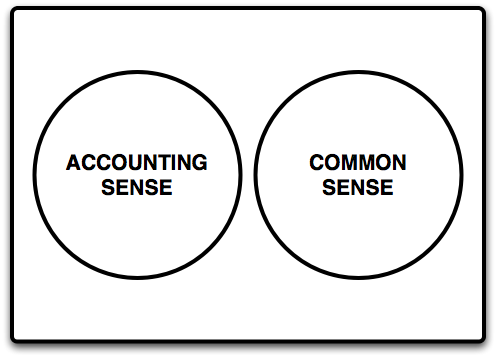The Accountants are Wrong: Common Accounting and a Poetic Post-Mortem
Here in Bangkok, one of the key “cross-cutting issues” has been the idea of “Common accounting”. It has plagued debates on developed and developing country emission reduction measures, its leaking into the Durban Platform, and it seems to be heating up as one of the key political hot coals that negotiators will have to carefully navigate leading into Doha.
So what is common accounting all about? Well, even that seems to be a bit of a contentious issue, as I just saw in the discussions on Nationally Appropriate Mitigation Actions (NAMAs) parties are dancing around the issue as if it was a sombrero at a Mexican fiesta.
According to China there is a key difference between “common accounting rules” and “accounting rules that ensure accountability“. And as you may have seen on my Live Twitter Feed, immediately following an intervention by the EU that used the words “common accounting rules” - China, India, South Africa and Brazil frantically flipped their name tags and prepared interventions that made the EU flee back like sick puppy to the dog house and an amendment that clarified “I didn’t mean common rules, but wanted to emphasize the exercise of clarification to avoid double counting”.
But throughout the discussions on developing country emissions reduction targets, there has been an ongoing push from EU and developed countries alike to enforce some style of ‘common accounting rules’ on the Nationally Appropriate Mitigation Actions that developing countries are being eagerly urged to submit.
On one hand, this is totally understandable. Anyone who has ever done any sort of research knows that you need ways of comparing information, and the closer these comparisons can be, the better it is. As UNFCC Executive Secretary Christiana Figueres said in an NGO briefing the other day, when it comes to emerging international carbon markets, “we need to know that a tonne in Brussels is worth the same as a tonne in Australia, and a tonne in Costa Rica”.
And when it comes to not just ‘encouraging’, but implementing and analyzing NAMAs, it will be critical that we are all able to compare what one country is doing with what another country is doing.
In response, developing countries have continued to stress the need for NAMA’s to be flexible to different country needs. Just that they don’t use the word “flexible“. That is a word saved for discussions on developed country emissions reductions. Instead they use a suite of other nice sounding words like “respects the country needs” and “diversity” and such and such. And this is fair enough as well…in the discussions on NAMA’s yesterday, the representative from Mali highlighted that in Sub-Saharan africa “we have some of the poorest people in the world but some of the highest energy prices” and so too did Bangladesh as well as a number of other countries highlight the “capacity, finance, HR, and technology limitations of poor countries trying to develop climate change mitigation strategies”.
And these realities were openly expressed and received yesterday in what turned out to be one of the most cordial and productive sessions I have seen here, kudos to the UNFCC for organizing these roundtable discussions; they seem to be clearing up the confusion between the North and South.
But then in the discussions on Mitigation for developed countries, it seems a bit like of “same same but different”. In these less than fruitful discussions, there is a historical role reversal that occurs where developing countries try to push developed countries into Legally Binding, inflexible mechanisms with, you guessed it, “common accounting rules”. And the developed countries, spearheaded by the US and my beard bearing muse, Jonathan Pershing push back for more “flexible” mechanisms. This is something I covered the other day in my thought for the afternoon, but it continues to infuse the Conference cocktails with a potent dose of double standard daiquiri. Especially when China has been the most forceful opponent of common accounting when talking about developing countries, but the No.1
enforcer when we talk about developed countries.
Now don’t get me wrong, I’m not saying it’s wrong to enforce a standard “common accounting” mechanism on developed countries. It has already become a standard recognized for developed countries. All I am trying to say is that I think it is no surprise that neither of these negotiating tracks have gained too much traction as developed and developing parties swap costumes between rooms on “common accounting”.
In an intervention yesterday, Norway forcefully recommended “common accounting” measures for developing country NAMAs by stating “Brazil started their intervention quoting a poet (surprisingly it was not me), and I’m an accountant, so I’m going to start with accounting“.
But what’s so wrong with a poetic solution to this whole side show? We all want some level of accountability in both measuring developed and developing party emissions, and we all want these discussions to move on. What’s more, developing countries have often stressed the need to receive “more support” from developed nations, whether it be in the form of “capacity building” (South Africa), “financial support” (Philippies), “Human resource building” (Bangladesh), “technical transfer” (Mali) or a “handbook” (Nigeria).
So instead of sitting in each of our silo’s and pounding the other parties with suggestions they would never uphold themselves, why don’t we continue to exchange experiences and build up combined common yet differentiated accounting framework together. In this respect, we figure out what should be “common” and use these as baselines, and then we incorporate a much broader emphasis on differentiation of mitigation options.
Over time, this aspect of differentiation will naturally coalesce as parties share experiences and move forward. And who knows, maybe by allowing differentiated accounting and reporting, we might find out new and interesting measures that are possible. But at the moment, there are 105 countries who still are yet to submit emissions reduction strategies and the greatest importance should be placed on facilitating participation, rather than forcing it.
In the end, it is far more important that countries are encouraged to get involved and congratulated for emissions reductions actions in a supportive and celebratory environment, rather than one which quells participation and incites “fear”.
So lets forget this double standard and work together on common but differentiated accounting principles. Oh, and lets have a party for each new country that submits a NAMA, one where we dance around sombreros for real! Drinks are on me

“Girls in costume dancing around a sombrero.,” Boston's Latino Community History, http://archives.neu.edu/latinohistory/items/show/31769.




-
Asha Naznin
-
marlon macebo
-
AMATI KENNEDY KILLISON
-
GO GREEN
About the author
Chris Wright
Climate researcher, political ecologist, activist and an award-winning slam poet from Australia.


